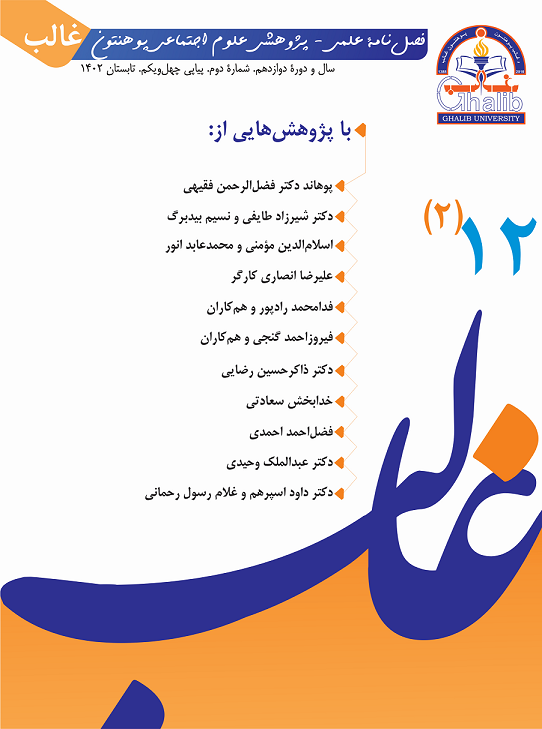Allegorical Epistemology and Comparison and its Correlation with Asfaar_e_ Arbaae
DOI:
https://doi.org/10.58342/ghalibqj.V.12.I1.11Keywords:
Epistemology, Metaphorical Epistemology, Transcendence Epistemology, Asfaar_e_ArbaaeAbstract
Knowledge is the ultimate goal of creation. Sharia and Islamic mysticism are the two interrelated ways and views of knowledge. The equalization of Sharia and Tariqa has a history from various aspects so, examining the view of these two areas on knowledge and their epistemological structure is of particular importance. The aim of this research is to find an answer to the question: What are the similarities and differences between analogical and Tanzihi epistemology and the mystical epistemology of Asfaar_e_Arbaae? In order to achieve this goal, the library data was analyzed using the comparative-analytical method, first the existing sources were seen about the epistemology of analogy and Tanzihi, and then the essence of Asfaar_e_Arbaae was criticized, and as a result, the findings show that: According to its tools, the knowledge of Asfaar_e_Arbaae method is more stable but the means of analogical knowledge is more limited. Mystical knowledge (through Asfaar_e_Arbaae) is related to properties and the forms of its generalization remain; also, the combination of similitude and transcendence is considered as one of the requirements of traveling in Arbaae’s journeys.
References
قرآن کریم.
آشتیانی، سیدجلالالدین. (1380). شرح مقدمۀ قیصری بر فصوصالحکم شیخ اکببر محییالدین ابنعربی. قم: بوستان کتاب.
اسپرهم، داود. (1396). هفت جُستار عرفانی. تهران: آرایان.
ـــــــــــ . (1397). تمثیل، خیال و تأویل. تهران: انتشارات دانشگاه علّامه طباطبائی.
ایزوتسو، توشهیکو. (1400). صوفیسم و تائوئیسم. ترجمۀ محمد جواد گوهری. چ هفدهم. تهران: روزنه.
بنیجمالی، شکوهالسادات؛ احدی، حسن. (1400). علمالنفس از دیدگاه دانشمندان اسلامی و تطبیق آن با روانشناسی جدید. چ سیاُم. تهران: انتشارات دانشگاه علّامه طباطبائی.
حسامیفر، عبدالرزاق؛ پورمهران، پدرام. (1394). «تشبیه و تنزیه نزد ابنعربی و اسپینوزا». ایران: مجلۀ تاریخ فلسفه. 5(4) 85-106. <https://elmnet.ir/article/1498481-81632/%D8%AA%D8%B4%D8%A8%DB%8C%D9%87-%D9%88-%D8%AA%D9%86%D8%B2%DB%8C%D9%87-%D9%86%D8%B2%D8%AF-%D8%A7%D8%A8%D9%86-%D8%B9%D8%B1%D8%A8%DB%8C-%D9%88-%D8%A7%D8%B3%D9%BE%DB%8C%D9%86%D9%88%D8%B2%D8%A7>.
حسینزاده، محمد. (1400). معرفتشناسی. چ سیوچهارم. تهران: مؤسسۀ آموزشی و پژوهشی امام خمینی.
رحمانی، غلامرضا. (1389). «سفر معنوی از فلوطین تا ملّاصدرا». ایران: ماهنامۀ معرفت. 19(159) 25-34. https://www.magiran.com/paper/846103.
رمضانی، رضا. (1381). «معرفتشناسی عرفانی». ایران: مجلۀ قبسات. 24. 15-39. <https://www.noormags.ir/view/fa/articlepage/61556>.
رهیاب، محمدناصر. (1401). شعر، هنر زبانیِ زیبا. دورۀ دوجلدی. ج 1. تهران: نشر آمو.
زمانی، مهدی؛ قاسمی، محمدجواد. (1391). «پیوند رؤیت فؤاد و بصر در معراج پیامبر(ص)». ایران: مجلۀ علمی – پژوهشی مطالعات عرفانیِ دانشکدۀ علوم انسانی دانشگاه کاشان. 16. 157-177. <http://s-erfani.kashanu.ac.ir/article-1-408-fa.html>.
سیدموسوی، سیدحسین. (1396). «سفرهای چهارگانۀ عرفا نزد تِلِمسانی و عبدالرزاق کاشانی». ایران: مجلۀ مطالعات عرفانی دانشکدۀ ادبیات و زبانهای خارجی دانشگاه کاشان. 26. 143-170. <http://s-erfani.kashanu.ac.ir/article-1-1341-fa.html>.
شمس، محمد جواد. (1389). تنزیه و تشبیه در مکتب ودانته و مکتب ابن عربی. تهران: نشر ادبیان.
غفاری، حسین؛ مقدم، غلامعلی. (1389). «فطرت و نقش آن در معرفتشناسی». ایران: دوفصلنامۀ آموزههای فلسفۀ اسلامیِ دانشگاه علوم اسلامی رضوی: 9،120-97. <https://ipd.razavi.ac.ir/article_1007.html>.
فتحیزاده، مرتضی. (1393). جستارهایی در معرفتشناسی معاصر. قم: کتابِ طه.
مرتجی، فاطمه؛ نجفیافرا، مهدی. (1397). «مبانی معرفتشناختیِ خیال در عرفان ابنعربی». ایران: دوفصلنامۀ پژوهشهای معرفتشناختی. 16. 7-30. <https://aadab.ctb.iau.ir/article_545352.html>.
ملاصدرا، صدرالمتألهین شیرازی. (1384). ترجمة اسفار اربعه. سفر اول – ج اول. ترجمة محمد خواجوی. تهران: مولی.
یزدان، محمدی. (1399). «ماهیت شناخت عقلی - تصوری در نظام فلسفی حکیم ابونصر فارابی». ایران: دوفصلنامۀ علمی هستی و شناخت: 7(1) 159-178.DOI: 10.22096/EK.2022.139037.1282.
References
Holy Quran.
Ashtiani, Seyed Jalaluddin. (2001). Description of Qaysari's introduction to Fuss al-Hakm by Sheikh Akbar Muhyiddin Ibn Arabi. Qom: Bostan_e_ Ketab
Bani Jamali, Shokoh al-Sadat; Ahadi, Hassan. (2021). Psychology from the point of view of Islamic scientists and its adaptation to new psychology. Thirty P. Tehran: Allameh Tabatabai University Press.
Fathizadeh, Morteza. (2013). Essays in contemporary epistemology. Qom: Taha book.
Ghaffari, Hossein; Moghadam, Gholam Ali. (1389). "Nature and its role in epistemology". The two-chapter of Islamic philosophy teachings of Razavi University of Islamic Sciences: 9.120-97. <https://ipd.razavi.ac.ir/article_1007.html>.
Hosamifar, Abdul Razzaq; Pourmehran, Pedram. (2014). "Comparison and contrast with Ibn Arabi and Spinoza". History of Philosophy: 5(4) 85-106. <https://elmnet.ir/article/1498481-81632/%D8%AA%D8%B4%D8%A8%DB%8C%D9%87-%D9%88-%D8%AA%D9%86% D8%B2%DB%8C%D9%87-%D9%86%D8%B2%D8%AF-%D8%A7%D8%A8%D9%86-%D8%B9%D8%B1%D8%A8 %DB%8C-%D9%88-%D8%A7%D8%B3%D9%BE%DB%8C%D9%86%D9%88%D8%B2%D8%A7 >.
Hosseinzadeh, Mohammad. (2021). Epistemology. The thirty-fourth P Tehran: Imam Khomeini Educational and Research Institute.
Izutsu, Toshihiko. (2021). Sufism and Taoism. Translated by Mohammad Javad Gohari. the seventeenth P. Tehran: Rowzeneh.
Morteji, Fatima; Najafiafra, Mehdi. (2017). "Epistemological foundations of fantasy in Ibn Arabi's mysticism". Epistemological research bi-monthly: 16. 30-7. <https://aadab.ctb.iau.ir/article_545352.html>.
Mullah Sadra, Sadr al-Mutalahin Shirazi. (2005). Translation of Asfar Arbaah. The first journey - the first chapter. Translated by Mohammad Khajawi. Tehran: Molly.
Rahmani, Gholamreza. (2010). "Spiritual journey from Plotin to Mollasadra". Marafat: 19(159) 25-34. <https://www.magiran.com/paper/846103>.
Rahyab, Mohammad Naaser. (2022). Poetry is a beautiful linguistic art. Two-volume course. C. 1. Tehran: Amoo Publishing.
Ramezani, Reza. (2002). "Mystical Epistemology". Qabsat. 24. 15-39. <https://www.noormags.ir/view/fa/articlepage/61556>.
Sayed Mousavi, Sayed Hossein. (2016). "Fourth journeys of the mystics near Tellemsani and Abdul Razzaq Kashani". Journal of mystical studies of the Faculty of Literature and Foreign Languages of Kashan University. 26. 143-170. <http://s-erfani.kashanu.ac.ir/article-1-1341-fa.html>.
Shams, Mohammad Javad. (2010). Tanzeh and Tashbeh in the school of Vedanta and the school of Ibn Arabi. Tehran: Adhabian Publishing House.
Sperham, Davood. (2016). Seven mystic seekers. Tehran: Arayan.
________________. (2017). Parable, imagination and interpretation. Tehran: Allameh Tabatabai University Publications.
Yazdan, Mohammadi. (2019). "The nature of intellectual cognition - an idea in the philosophical system of Hakim Abu Nasr Farabi". Two-part Scientific Journal of Existence and Cognition: 7(1) 159-178. .
Zamani, Mahdi; Ghasemi, Mohammad Javad. (2011). "The connection between Fouad's vision and Basr's vision in the ascension of the Prophet (PBUH)". Scientific-Research Journal of Mystical Studies of the Faculty of Humanities, Kashan University. 16. 157-177. <http://s-erfani.kashanu.ac.ir/article-1-408-fa.html>.
Downloads
Published
How to Cite
Issue
Section
License
Copyright (c) 2023 Ghalib Journal

This work is licensed under a Creative Commons Attribution 4.0 International License.













